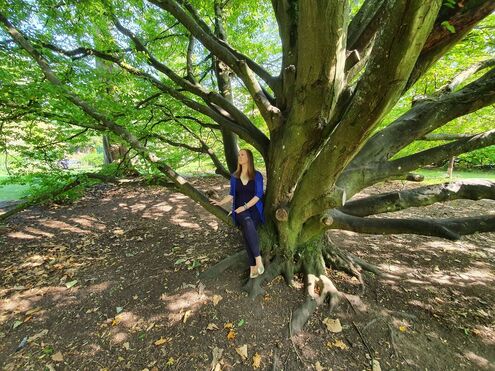Mindfulness and compassion training
Welcome, my name is Carla-Jo, I am passionate about living life with mindfulness and compassion.
I offer 8 week Breathworks mindfulness courses for groups and 1-1 clients, bespoke mindfulness mentoring packages and one off workshops.
All my offerings can be taken online so you can work with me from where ever you are in the world.
Enjoy exploring my website and do contact me to find out more about how I can guide you on your path.
I offer 8 week Breathworks mindfulness courses for groups and 1-1 clients, bespoke mindfulness mentoring packages and one off workshops.
All my offerings can be taken online so you can work with me from where ever you are in the world.
Enjoy exploring my website and do contact me to find out more about how I can guide you on your path.
Coming soon......
Mindfulness mentoring for women with adhd.
Contact me to be put on the mailing list.

Coming soon...Friday Morning Mindfulness classes on zoom 9.30-10.30gmt.
With mindfulness meditation we're not trying to get rid of or fix our feelings/thoughts/emotions...we are already whole...the practice is to understand and come into a new relationship with what's arising and that is deeply healing and freeing.
With mindfulness meditation we're not trying to get rid of or fix our feelings/thoughts/emotions...we are already whole...the practice is to understand and come into a new relationship with what's arising and that is deeply healing and freeing.
During the session I will offer some short reflections and then we will practice together.
There is also space to share about your experience.
This is for people who already have some understanding of mindfulness and compassion practice.
All the meditations will be guided.
i offer the session on a sliding scale between £8 and £15. it takes place on zoom.
Please note that this workshop isn't suitable for people in the acute or chronic stages of depression/anxiety/mental illness . If you are unsure if what I offer is for you please contact me so we can discuss your situation.
There is also space to share about your experience.
This is for people who already have some understanding of mindfulness and compassion practice.
All the meditations will be guided.
i offer the session on a sliding scale between £8 and £15. it takes place on zoom.
Please note that this workshop isn't suitable for people in the acute or chronic stages of depression/anxiety/mental illness . If you are unsure if what I offer is for you please contact me so we can discuss your situation.

Breathworks Mindfulness for stress 8 week online course starting in the Autumn 2023.
Register Soon!
This course will cost £100 for the first 4 weeks and £100 for the second. Each session will be 2 hours and run from 10.30-12.30 on Zoom. There will be a 15 minute break in the middle. You will get a set of MP3's for the course. There is also a book to go with it which you can buy but that is optional. You will be given home practice each week to develop your mindfulness skills. I will email you some basic notes of what we covered in each session.
Please note that this course isn't suitable for people in the acute or chronic stages of depression/anxiety/mental illness . If you are unsure if what I offer is for you please contact me so we can discuss your situation.
Dates to be announced :
The courses includes an online half day retreat. This will be £30. There will be a 30 minute lunch break. (This is also part of the 8 week course, it is encouraged that you commit to this as part of your training. It will only be for the people on this course).
The course content :
1. Mindfulness: Learning to Choose Much of our stress is exacerbated by our resistance to unpleasant experience, and what we resist tends to persist. So we are caught in a trap: the more we resist the more it persists! Mindfulness allows us to accept experience rather than reacting to it, which - paradoxically - allows us to let go of it. This lightens our load considerably, allowing us to get on with our life quite happily, even though it’s not completely sorted. (And will it ever be?)
2. Coming to Our Senses When we’re stressed we naturally try to do something about it, and this usually entails thinking - problem-solving. The trouble with this strategy is that it doesn’t work very well! In fact it’s more often than not counter-productive. Thinking about our stress tends to keep us stressed! An important aspect of mindfulness practice is to pay more attention to our senses - body sensations, sounds, sights, tastes - which brings us back to our actual experience in the moment. This greatly reduces stress.
3. Working with Thoughts Thoughts are one of the main causes of stress, trapping us in a loop in which we try to solve our problems, while the very act of trying to solve the problem keeps us tied to the problem. But what to do? We can’t just stop thinking! One of the skills you’ll be teaching your students is noticing thoughts as they arise in the mind and letting them go. This is a liberating insight for people who attend the course.
4. Working with Difficult Experiences Life, as you know, isn’t easy. Financial worries, issues around the way we earn our living and with work colleagues, difficulties in our relationships with family and friends - who doesn’t have them? Mindfulness doesn’t make everything nice and smooth and easy. Rather, it enables us to develop skills and inner resources to cope better - in fact to flourish - in the midst of the sometimes difficult and messy aspects of life. Learning how to be with unpleasant, difficult experiences without allowing them to ‘press our buttons’ is a key skill that you’ll teach your students.
5. Noticing the Good Things Not that life is unremittingly difficult either! There’s pleasure, enjoyment, beauty and love out there too. When we experience some difficulty in life we have a tendency to focus on it, often to the exclusion of all else, and especially the good things that are happening. On this week of the course we encourage our students to widen their gaze a little and notice the small pleasures of life, which often go unremarked - the sun coming from behind a cloud and warming their face, a vase of yellow and blue flowers, a compliment from a friend, a job well done. We’re not asking them to ‘think positive’, just trying to level the playing field. By noticing the good things and letting them affect us we’re working against what neuro-scientists call the inbuilt ’negativity bias’ in the brain.
6. Kindfulness In a way the word mindfulness gives a wrong impression. People often associate the mind with the head, with the brain, with cool, analytical thought. Mindfulness certainly isn’t that. It’s simply awareness, and not a cool and detached awareness either - it’s warm, gentle, and kind. We emphasise this all the way through the course but in this week we bring it right into centre stage and introduce a kindness meditation. During this week we will also explore Dr Paul Gilbert's 3 emotional regulation systems.
7. The Social Dimension of Mindfulness When we’re having a hard time it’s easy to become preoccupied with our suffering, and this can become a trap. In the last part of the course we take the kindness meditation further, bringing others to mind and cultivating a warm, gentle, kindly awareness towards them too. This can be difficult, especially if a person or people are the cause of their stress. However, research has shown that developing a more kindly attitude towards others has a very beneficial effect on the state of our mind and body, including the reduction of stress.
8. The Rest of Your Life. On the final week of the course we review everything we’ve learned and practiced, and we look to the future. The course only works to the extent that we practice. Now that we’ve come to the end of the course, how will you continue to practice and continue to benefit from it? We discuss ways of keeping inspired and reviving our inspiration when it flags. And we encourage you to look after yourself in the future. This isn’t ‘selfish’, it’s sensible. After all, if you’re going to be any help to others, you have to be in pretty good shape yourself!
Contact me to book your place. Maximum 10 places available.
Register Soon!
This course will cost £100 for the first 4 weeks and £100 for the second. Each session will be 2 hours and run from 10.30-12.30 on Zoom. There will be a 15 minute break in the middle. You will get a set of MP3's for the course. There is also a book to go with it which you can buy but that is optional. You will be given home practice each week to develop your mindfulness skills. I will email you some basic notes of what we covered in each session.
Please note that this course isn't suitable for people in the acute or chronic stages of depression/anxiety/mental illness . If you are unsure if what I offer is for you please contact me so we can discuss your situation.
Dates to be announced :
The courses includes an online half day retreat. This will be £30. There will be a 30 minute lunch break. (This is also part of the 8 week course, it is encouraged that you commit to this as part of your training. It will only be for the people on this course).
The course content :
1. Mindfulness: Learning to Choose Much of our stress is exacerbated by our resistance to unpleasant experience, and what we resist tends to persist. So we are caught in a trap: the more we resist the more it persists! Mindfulness allows us to accept experience rather than reacting to it, which - paradoxically - allows us to let go of it. This lightens our load considerably, allowing us to get on with our life quite happily, even though it’s not completely sorted. (And will it ever be?)
2. Coming to Our Senses When we’re stressed we naturally try to do something about it, and this usually entails thinking - problem-solving. The trouble with this strategy is that it doesn’t work very well! In fact it’s more often than not counter-productive. Thinking about our stress tends to keep us stressed! An important aspect of mindfulness practice is to pay more attention to our senses - body sensations, sounds, sights, tastes - which brings us back to our actual experience in the moment. This greatly reduces stress.
3. Working with Thoughts Thoughts are one of the main causes of stress, trapping us in a loop in which we try to solve our problems, while the very act of trying to solve the problem keeps us tied to the problem. But what to do? We can’t just stop thinking! One of the skills you’ll be teaching your students is noticing thoughts as they arise in the mind and letting them go. This is a liberating insight for people who attend the course.
4. Working with Difficult Experiences Life, as you know, isn’t easy. Financial worries, issues around the way we earn our living and with work colleagues, difficulties in our relationships with family and friends - who doesn’t have them? Mindfulness doesn’t make everything nice and smooth and easy. Rather, it enables us to develop skills and inner resources to cope better - in fact to flourish - in the midst of the sometimes difficult and messy aspects of life. Learning how to be with unpleasant, difficult experiences without allowing them to ‘press our buttons’ is a key skill that you’ll teach your students.
5. Noticing the Good Things Not that life is unremittingly difficult either! There’s pleasure, enjoyment, beauty and love out there too. When we experience some difficulty in life we have a tendency to focus on it, often to the exclusion of all else, and especially the good things that are happening. On this week of the course we encourage our students to widen their gaze a little and notice the small pleasures of life, which often go unremarked - the sun coming from behind a cloud and warming their face, a vase of yellow and blue flowers, a compliment from a friend, a job well done. We’re not asking them to ‘think positive’, just trying to level the playing field. By noticing the good things and letting them affect us we’re working against what neuro-scientists call the inbuilt ’negativity bias’ in the brain.
6. Kindfulness In a way the word mindfulness gives a wrong impression. People often associate the mind with the head, with the brain, with cool, analytical thought. Mindfulness certainly isn’t that. It’s simply awareness, and not a cool and detached awareness either - it’s warm, gentle, and kind. We emphasise this all the way through the course but in this week we bring it right into centre stage and introduce a kindness meditation. During this week we will also explore Dr Paul Gilbert's 3 emotional regulation systems.
7. The Social Dimension of Mindfulness When we’re having a hard time it’s easy to become preoccupied with our suffering, and this can become a trap. In the last part of the course we take the kindness meditation further, bringing others to mind and cultivating a warm, gentle, kindly awareness towards them too. This can be difficult, especially if a person or people are the cause of their stress. However, research has shown that developing a more kindly attitude towards others has a very beneficial effect on the state of our mind and body, including the reduction of stress.
8. The Rest of Your Life. On the final week of the course we review everything we’ve learned and practiced, and we look to the future. The course only works to the extent that we practice. Now that we’ve come to the end of the course, how will you continue to practice and continue to benefit from it? We discuss ways of keeping inspired and reviving our inspiration when it flags. And we encourage you to look after yourself in the future. This isn’t ‘selfish’, it’s sensible. After all, if you’re going to be any help to others, you have to be in pretty good shape yourself!
Contact me to book your place. Maximum 10 places available.
Photo by Frank Mackenna on Unsplash
Photo Credits - First Ocean pic - romello williams / Pic above - both via unsplash
breathworks 8 week mindfulness courses8 week courses ranging
|
mindfulness
|
" The work Carla-Jo has done with me has had a transformational effect on my life in very positive way. At a time of great stress in my life, I have been able to tap into the wonderful techniques of mindfulness to unlock my self awareness and to be in present during this time. Carla-Jo shows great kindness and generosity in her training throughout my mindfulness course. I would like to thank Carla-Jo for her work with me and I am still practising mindfulness everyday " TH
|





